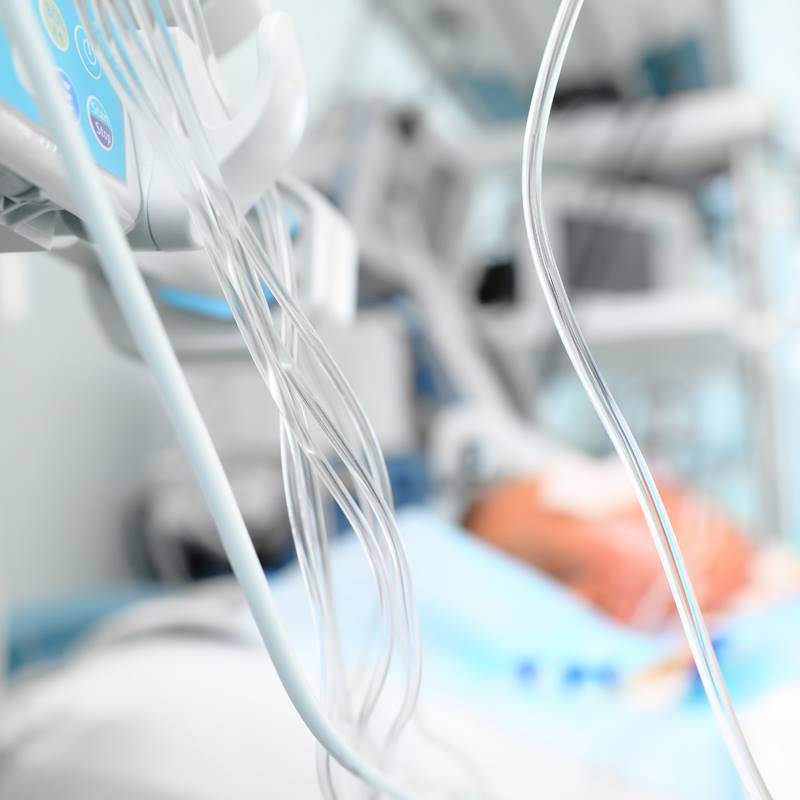Use Intermountain Connect Care®
Learn More.
How can we help?

Monoclonal antibodies, which are modified, concentrated versions of the immune system’s response to infection, are currently being used to treat outpatients with COVID-19 based on early results from clinical trials. Whether one or more such antibodies may be helpful for COVID-19 patients sick enough to require hospitalization is not yet known. However, a new international study to which Utah researchers made major contributions, has found that the Eli Lilly monoclonal antibody LY-CoV-555, also known as bamlanivimab, is ineffective as a treatment for hospitalized COVID-19 patients.
“While this particular monoclonal antibody has shown promise for preventing patients with mild cases of COVID-19 from progressing to the point they need to be hospitalized, we found that it doesn’t make a difference for those already sick enough to need hospital level care,” said Kirk U. Knowlton, MD, Director of Cardiovascular Research at Intermountain Healthcare, and site principal investigator at Intermountain Medical Center for the study. The results were recently published in the New England Journal of Medicine.
The study enrolled 314 patients across 31 hospitals in the U.S., Denmark and Singapore, including Intermountain Medical Center and the University of Utah Hospital, between August 5 and October 13. These patients had tested positive for COVID-19 and required hospitalization but were not in organ failure or on a ventilator. They were already receiving other kinds of treatments, including the anti-viral medication remdesivir (95%), a steroid medication (49%) and/or medicines to prevent blood clots (51%).
Of that group, 163 patients received 7000 mg of LY-CoV555, and 151 received a matching placebo. After five days, researchers found no significant difference in how COVID-19 progressed between the two groups.
“These results don’t mean that LY-CoV555 doesn’t really work in outpatients, or that another monoclonal antibody won’t work on people who are hospitalized, but in this particular instance, it’s not a good match between treatment and patient,” said Samuel M. Brown, MD, MS, director of Pulmonary/Critical Care research at Intermountain Medical Center and a member of the international committee that designed and led the trial.
“We need to remember the lessons we learned with Ebola: we had to test several different antibodies before we found the ones that are effective against a serious virus infection. I’m optimistic that we will find antibodies that work for our more seriously ill patients—in the next phase of the study we’ll be evaluating more promising antibodies,” said Dr. Brown.
Monoclonal antibodies are proteins designed to mimic an immune system’s natural response, and LY-CoV555 was created based on the blood sample of one of the first known U.S. patients who recovered from COVID-19. Monoclonal antibodies attach to the spike protein of the virus in order to block the mechanism by which the virus infects cells and spreads through the body.
LY-CoV555 had previously been shown to decrease viral load in patients who had already tested positive for COVID-19. It has also been associated with fewer hospitalizations or visits to the emergency room by patients who received the treatment before they became sick enough to require that level of care. The FDA gave Eli Lilly an emergency use authorization on November 9, 2020 for the treatment of patients who don’t yet require hospitalization, a therapy that’s being provided in Utah to patients at high risk for severe disease.
“Right now, monoclonal antibodies are scarce, so we want to make sure that we’re giving them to patients who they’re most likely to work on,” said Knowlton. “This study indicates that LY-CoV555 may be better used on patients with mild to moderate COVID-19 to keep them out of the hospital, but not patients who are already there.”
“This study is yet another reminder of the remarkable capacity of Utahans to answer critical questions for patients in need. Intermountain and University of Utah research staff and patients and their families, drawing on a 30-year collaboration seeking treatments for patients with life-threatening lung injury like that caused by COVID-19, made pivotal contributions to this study. I’m honored to live and work in this great state,” said Dr. Brown.
This research was funded by Operation Warp Speed and carried out by collaborations within the National Institutes of Health that bring together experts in intensive care, infectious disease, heart disease, and epidemiology. Specifically, the National Institute of Allergy and Infectious Diseases, the National Heart, Lung and Blood Institute, the Department of Veterans Affairs, and the governments of Denmark, Australia, and U.K contributed to the study. Study medications were donated by Gilead Sciences and Eli Lilly.
“This study demonstrates the importance of collaboration among multiple networks to rapidly and efficiently conduct clinical trials,” said James P. Kiley, PhD, Director of the Division of Lung Diseases, National Heart, Lung and Blood Institute.
###